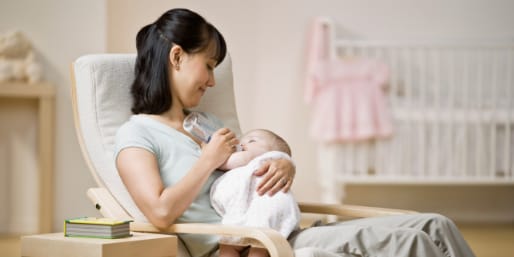Overview
Coronaviruses (CoV) are a large family of viruses that cause illness ranging from the common cold to more severe diseases, evidence shows that the coronavirus is transmitted through human to human direct contact.1
The Royal College of Obstetricians and Gynaecologists (RCOG) and other UK maternity health bodies have published guidance on coronavirus (COVID-19) in pregnancy, breastfeeding and bottle-feeding2. This article focuses on advice to give parents who are bottle-feeding.
For coronavirus and breastfeeding advice find more information in our article on managing coronavirus in pregnancy and advice on breastfeeding.
General bottle feeding advice
Bottle-feeding includes formula feeding, feeding expressed breast milk (EBM) or combination feeding. Combination feeding is when breastfeeding is supplemented with bottle-feeding– using formula or expressed breast milk.3.
Parents’ bottle-feeding hygiene should include making sure they wash their hands with soap and water (for at least 20 seconds) before touching their baby4 and before they handle the formula or bottle. They should carefully follow the manufacturer’s instructions on making up formula feeds and current guidance on washing and sterilising of feeding equipment.4
Sterilising baby bottles and equipments
If a parent is formula feeding or feeding EBM to their baby, they should be washing and sterilising baby bottles and all their feeding equipment carefully before each use and strictly adhering to manufacturer’s instructions on washing and sterilisation.4 You can use our unbranded helpsheet on steam sterilising with parents.
Making up formula feeds
Parents who are formula feeding should carefully follow manufacturer’s instructions4 on using the right amount of formula and water and preparing each feed in individual bottles when required. We have created helpsheet on preparing and giving a bottle which will provide more information for parents on how to correctly prepare a feed.
Expressing breast milk
If a parent is expressing breast milk to provide through a bottle to their baby, they should be advised to always wash their hands thoroughly before touching the breast, breast pump and bottles. Also clean the breast pump and it’s parts before and after a pumping session according to the manufacturer’s instructions.4 Find our helpsheet on expressing breast milk by hand here.
Combination feeding
Parents should maintain all the above advice on hand washing, equipment washing and sterilising of baby bottles and feeding equipment to safely feed their baby. You will find information on combination feeding here.
If a parent is too unwell to feed their baby, they should ask someone else to help with feeding duties making sure they still follow the same hygiene rules. At the same time, it is important that parents continue to interact with baby as much as possible. Parents who are asymptomatic should not be required to wear masks when interacting with their baby.5
If women have suspected or confirmed Covid-19, the World Health Organisation recommends that they should wear a mask when handling the baby but should be enabled to remove it and interact visually with the baby at a safe distance6
For further practical support and advice, you can contact our SMA Nutrition Careline team.

